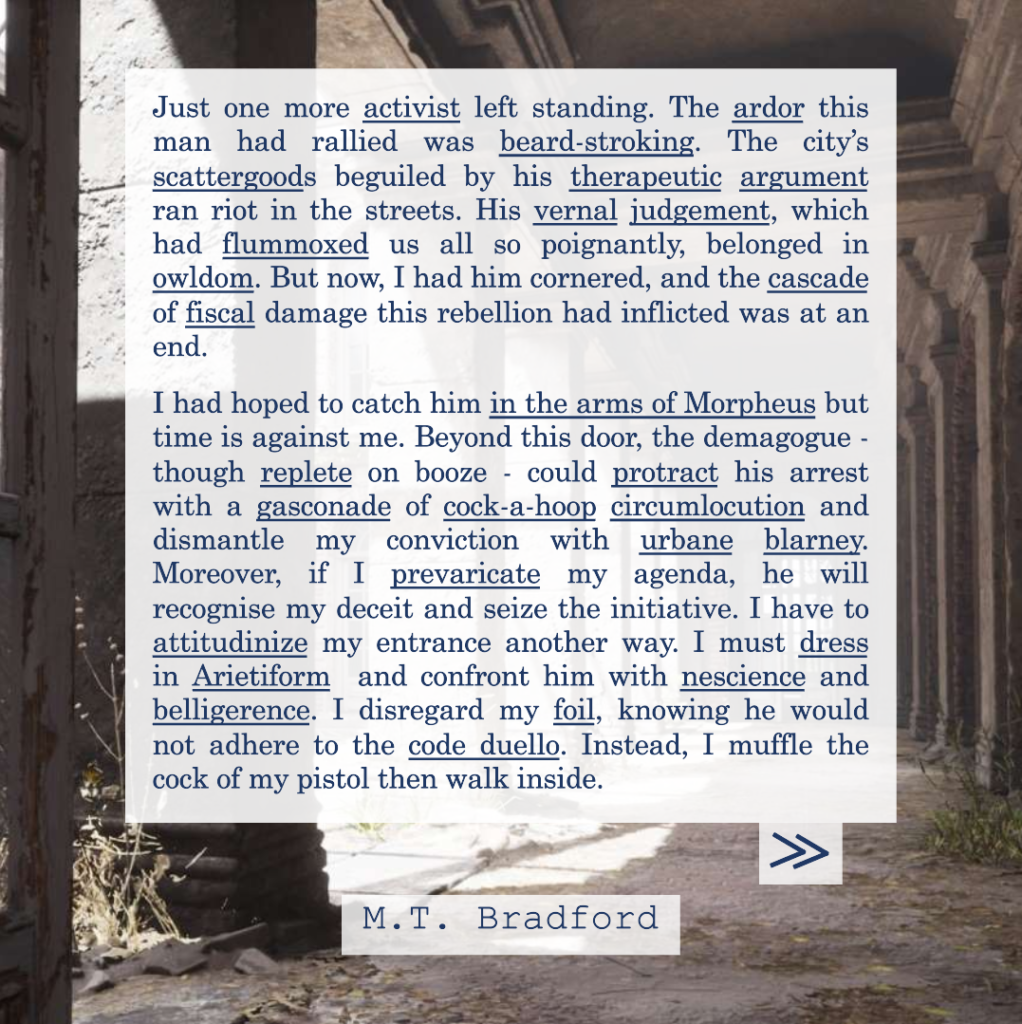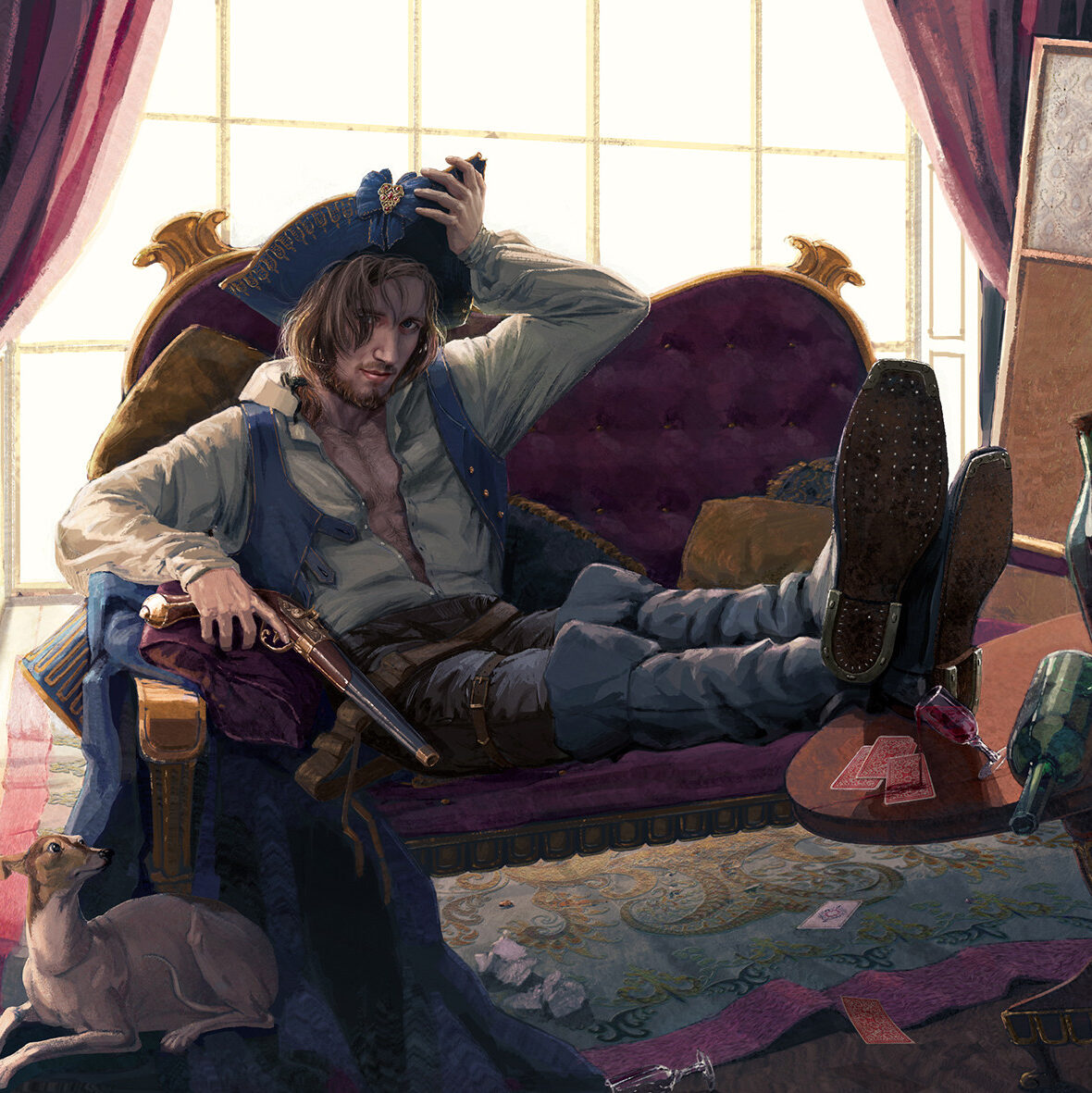

2021-03-21 #diceRollProse
Stats
Words: 158
Words-of-the-day: 28
Inclusion: 18%
Sentences with no words-of-the-day: 1
Most words-of-the-day in one sentence: 7
Nouns: 15
Adjectives: 7
Verbs: 4
Words of the week
Activist (n): a person who uses or supports strong actions (such as public protests) to help make changes in politics or society.
Ardor (n): Feelings of great warmth and intensity.
Beard-stroking (adj): given to or characterized by the stroking of one’s beard, esp, while deliberating or reflecting on a question. Hence: over-intellectual, pretentious.
Therapeutic (adj): producing good effects on your body or mind.
Scattergood (n): Someone who spends money prodigally. Spendthrift.
Argument (n).
Vernal (adj): of or relating to spring.
Judgement (n).
Flummoxed (adj):utterly bewildered, confused, or puzzled.
Owldom (n): the realm or domain of owls.
Cascade (n).
Fiscal (adj): of or relating to taxation, public revenues, or public debt.
In the arms of Morpheus (v): asleep, sleeping.
Replete (adj): fully or abundantly provided or filled (fed).
Protract (v): Lengthen in time; cause to be or last longer. Prolong, draw out, extend.
Gasconade (n): extravagant boasting; boastful talk.
Cock-a-hoop (adj): Exhibiting self-importance.
Circumlocution (n): the use of an unnecessarily large number of words to express an idea. Evasion in speech.
Urbane (adj): Showing high degree of refinement and the assurance that comes from wide social experience.
Blarney (n): skillful flattery: blandishment.
Prevaricate (v): to deviate from the truth: equivocate.
Attitudinise (v): to assume an affected mental attitude : pose.
Dress (v).
Arietiform (n): having the shape of a ram’s head or of the astrological symbol or Aries.
Nescience (n): lack of knowledge, ignorance.
Belligerence (n): a hostile or warlike attitude, nature, or inclination.
Foil (n): a light slender flexible sword tipped by a button and usually having a bell-shaped guard.
Code duello (n): An established set of rules or conventions followed by duellists.
Unused Words of the week
Corona (n)
Coronal (n): flower arrangement consisting of a circuler band of foliage or flowers for ornamental purposes.
Equinox (n):
Gotch (n):(Canadian slang) underpants; a pair or underpants.
Haimish (adj): homey, cozy and unpretentious.
Hit the books (v).
Lickety-split (adv)
Macushla (n): (Irish English) darling.
Minx (n).
Negaholic (n): a person with an excessively or habitually pessimistic outlook.
One-drop (n): A type of drum rhythm used by reggae music, with strong emphasis on the third beat rather rhan the expected first and third in a bar of four beats. (also) music featureing the type of rhythm.
Pialla (v): (Australian aboriginal usage): to tell (news etc); to speak to, entreat.
Relativity (n): the state of being relative to something else; the absence of the universally applicable rules or standards.
Smithereens.
Breakdown
My, my, my, this is a great one. Succinct, cohesive and tense, with a new record for total words-of-the-day included, 28. This prose hearkens back to No Robots allowed with its political theme. It’s not hard to see why with words like activist, circumlocution, argument, fiscal, attitudinize and prevaricate that can easily be associated with politicians (especially the last one). There was a theme of renaissance and romance France in the words-of-the-day such as gaconade, code duello and foil. It took me a while to find my complimentary image here but it was worth it. Thank you Feael.
The beauty of this piece, I feel, lies in the ominous feelings the protagonist has for the antagonist and that you don’t know which side is morally right. The first sentence kicks things off abruptly. ‘Just one more left standing.’ Let’s you know right away the protagonist has been party to a mission to silence activists. And the fact that it is an activist makes you think that the protagonist must be working with the existing government. The paragraph follows by building a picture of how influential this particular rebel has become. So much so, you get a sense of fear from the protagonist as they describe the rebel’s ardor as beard-stroking and his judgement worthy of owldom.
My favourite sentence has to be the busy paragraph two sentence two. It drives the plot forward in one swoop, and again adds to the protagonist’s trepidation of the man he must face, knowing that even though he’s drunk he’s still formidable. The image of the antagonist continues to grow as the protagonist describes what they think will happen. ‘A gasconade of cock-a-hoop circumlocution,’ three words I now feel must be used in everyday speech. Together they are saying ‘clever babble full of self important boasting,’ only far far more pompous and perfect for this narration. The sentence ends with urbane blarney, which is a delicious finish to the protagonist’s apprehension of the antagonist’s striking character.
I put attitudinise to good effect across the last few sentences as the protagonist tries to shake off their fear and figure out how they want to play out the confrontation. There is some nice use of the ‘s’ sound with dress, belligerence and nescience which helps tie the attitudinising together. When the protagonist considers their foil and the code duello it brings the image of a man shuffling nervously at a door while listening to his enemy’s frivolity on the other side. Did you picture that too?
Some other points of note are:
- vernal, which means spring; fresh; youthfulness. I like the inferable dual meaning here that vernal refers to both the antagonist’s fresh argument and his young age.
- In the arms of Morpheus was added last minute. See how the prose could work fine without the first sentence of paragraph two? I am glad I added it though, it emphasises the education and upper class personalities of the characters.
- I was glad I pushed myself to think of foil as the sword rather than the common verb or tin foil we are very familiar with. I did my research on the this and foil in this context does makes sense. You may think of the foil in fencing as the blunt nibbed practise weapon, which it it, but in the 18th century they were often worn as decorative weapons and duellists would remove the protective tips to partake in a bloody joust.
Overall, the most enjoyable feature of this piece, for me, is the ambiguous line of morality limned for both sides of this conflict. The antagonist has clearly rallied support of scattergoods – which we imagine are the poor and middle-class populous. He must have kindled a righteous rebellion in order to be a problem of this degree. However, the protagonist talks of the fiscal damage caused by the rebellion which construes the antagonist as reckless, maybe not understanding he’s caused more harm than good.
